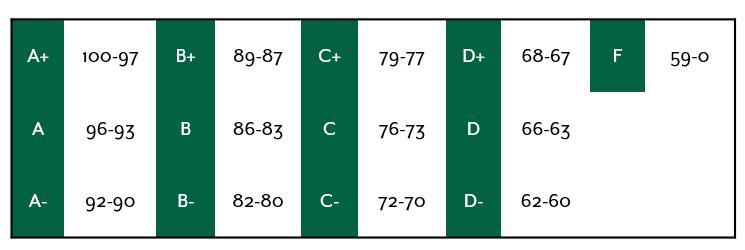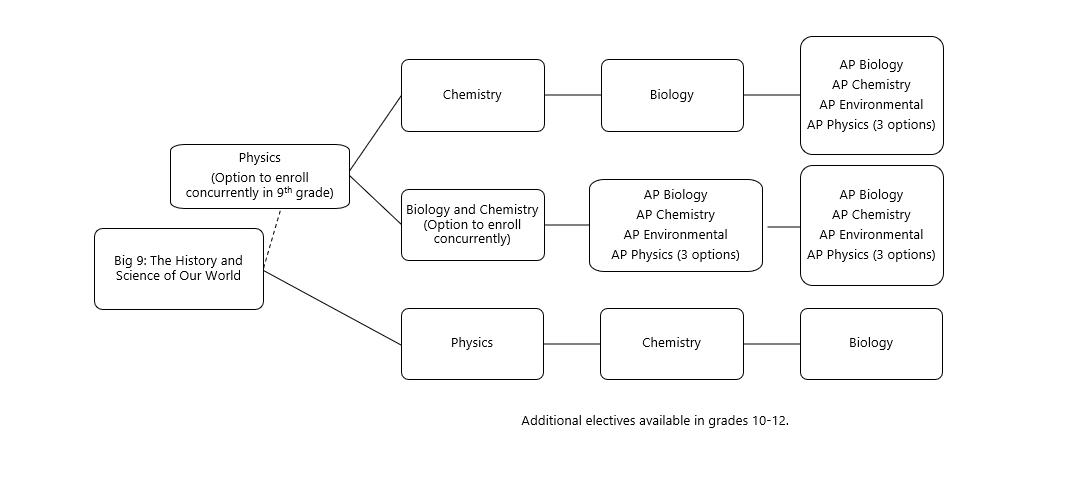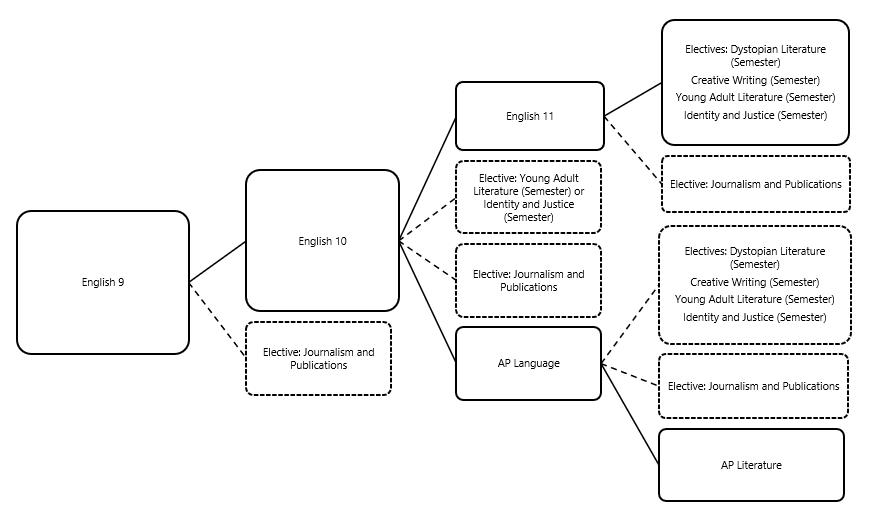
7 minute read
HISTORY
fix History
Course Sequence
Advertisement
Big 9: The History and Science of Our World
Note: This is a required course for all ninth graders starting with the Class of 2025. This course awards students both a history and science credit and is taught as a “double-block” taking up two class periods. Students explore diverse science and humanities through a carefully crafted and interdisciplinary curriculum to get a bigger sense of the stories of Us, the creation of the universe, and the ascent of mankind. Students create “Big Questions”, design research, and claim test theories, while developing thinking skills, mindsets, and mature study skills which will set them on the path to maximize their Upper School experience. The course is designed in conjunction with the grade 9 English experience to combine the best of a curated interdisciplinary model across these disciplines. From the Big Bang to the Enlightenment, students will be challenged to consider diverse human conditions and issues, allowing them to form their personal responses to parallel questions in the modern world. As this course covers both the History and Science of our World, it receives both a science and a history credit. 9
Modern World History
This course focuses on the modern world taking the revolutions of the 18th century: the industrial and the Enlightenment-inspired Atlantic as its starting point. It continues the focus of studying history with a global mindset, allowing students to better understand the vital connections between various peoples and regions of the world. The key frames students use to examine the human story include networks, communities, and production and distribution. Through these frames they will study belief systems, geography and environment, economic systems, arts and ideas, government and citizenship, migration and diffusion, science and technology, and society. Students will also further develop the skills they learned in Grade 9, including critical reading, contextualizing, sourcing, corroboration, thesis generation, evidence application, and analytical writing. 10, 11
United States History
Note: Due to the change in history sequence, US History will not be offered in the 21-22 school year. This course will be offered again in the 22-23 school year. Students will study U.S. History in its global context. Through this investigation, they will gain an understanding of their place in the world. They will also develop historical thinking skills, such as understanding historical context, analyzing primary and secondary source material, developing a defensible argument, and looking at history through multiple perspectives.
11
AP United States History
Note: Due to the change in history sequence, AP US History will not be offered in the 21-22 school year. This course will be offered again in the 22-23 school year. Prerequisite: B (Final Grade) in previous history course or permission of instructor. In this course, students prepare for the Advanced Placement national examination in U.S. history by studying such topics as indigenous America, the age of discovery, colonialism, the Revolution and establishment of the early republic, economic growth in the 19th century, slavery and its legacy, the Civil War and Reconstruction, the development of the West, populism and progressivism, participation in two World Wars, the Depression, the Cold War, Vietnam, and contemporary America. The course integrates such themes as demographic change, economic transformations, and diplomacy so that students may understand more general concepts of continuity and change over time. Extensive writing is required, including frequent document-based essays. Strong reading comprehension skills are also needed to handle the college-level textbook and multiple additional primary source readings. 11
AP World History: Modern
Prerequisite: Teacher approval The AP World History: Modern course prepares students for the Advanced Placement national examine in Modern World History and focuses on developing students’ understanding of world history from approximately 1250 CE to the present. In this course, students investigate the content of world history for significant events, individuals, developments, and processes in nine units, and develop and use the same thinking skills and methods (analyzing primary and secondary sources, making historical comparisons, chronological reasoning, and argumentation) employed by professional historians when they study the past. The course employs five themes (interaction between humans and the environment; development and interaction of cultures; state building, expansion, and conflict; creation, expansion, and interaction of economic systems; development and transformation of social structures) that students explore in order to make connections among historical developments in different times and places encompassing the major geographical regions of the globe: Africa, the Americas, Asia, Europe, and Oceania. Extensive writing is required, including frequent document-based essays. Strong reading comprehension skills are also needed to handle the collegelevel textbook and multiple additional primary source readings. Students are expected to read and digest an average of 10-20 pages of reading per night. 10, 11, 12
Electives
Race and Racism (Semester)
Race & Racism examines the intent and impact of racism in the United States. This course elicits difficult conversations as it touches upon historical events that are pivotal in race relations in the United States. These guided conversations are facilitated by a certified DEI practitioner and are centered on the self-awareness and empathy of the students. This course discusses and wrestles with the concept of race as a social construct as well as the impact of both individual and systemic racism on people of color in the United States. Students identify the use of microaggressions in social themes, literature and popular culture and they deconstruct biases and stereotypes to understand the underlying messages that racism conveys in our culture today. This class focuses on the practice and meaning of anti-racism. Students recognize their own biases and participate in authentic conversations about race and focus equally on personal growth as the impact of racism on our society. 10, 11, 12
Research Seminar (Semester)
Note: This course is run as an asynchronous, blended course in the style of a BLinc. Students will work on their Research Seminar coursework in the Vos Family Academic Resource Center during the scheduled block. They will have occasional scheduled synchronous meetings with their teachers and peers during the research and writing process. Note: This course will also be available to take as a summer term BLinc course. Additional fee applies. The Indian Creek Research Seminar is a ½ credit college preparatory course focused on developing students’ skills and experience in investigating and writing a research project. The research theme is open to what a student is interested in pursuing in the general field of Humanities as it applies to the modern world. This gives students the opportunity to find a topic they have a passion in and dig deep into understanding how it evolved to its current state. Topics could stretch from political issues such as why the U.S electoral college was developed and why there is conflict in Kashmir to more pressing issues such how vaccines can be so controversial, the evolving role of religion in the interconnected world, and the growing diversity of narratives in literature. Class lessons will concentrate on current events, topic selection, finding and evaluating sources, thesis development, paper organization, and academic writing. By the course’s end, students should become both more capable academic writers and more aware of the world around them. 10, 11, 12
United States Government 1A: Foundations of the American Political System (Semester)
Note: This fall semester course can be taken on its own as an introduction to United States Government, or it can be taken as the fall semester of a yearlong experience along with AP United States Government that fully prepares students for the AP U.S. Government and Politics Exam. This course is designed to acquaint students with the origins, concepts, organizations, and policies of the United States government and political system. The class will specifically cover the foundations of the U.S. government system and the interaction between the branches of government. To increase comprehension, students will read and analyze relevant primary and secondary source documents and incorporate this knowledge into assignments. 11, 12
AP United States Government (1B) (Semester)
Prerequisite: U.S. Gov 1A or permission of instructor. In this course, students will prepare for the Advanced Placement national examination in U.S. Government and Politics through a course of study that provides an analytical perspective on government and politics in the United States. This course involves both the study of general concepts used to interpret U.S. politics and the
analysis of specific case studies. It also requires familiarity with the various institutions, groups, beliefs, and ideas that constitute U.S. political reality. The course will take a more in-depth look at U.S. government than the U.S Government 1A class and builds upon the knowledge in that course by expanding to cover political ideologies, civil rights, and political participation. Students are expected to read and digest an average of 10-20 pages of reading per night, write essays, engage in research projects, and exhibit a willingness to discuss, debate, and argue positions in class. 11, 12
Global Online Academy History Offerings
Visit https://globalonlineacademy.org/student-program/student-courses and select “Social Sciences” to see approved course offerings through GOA.





